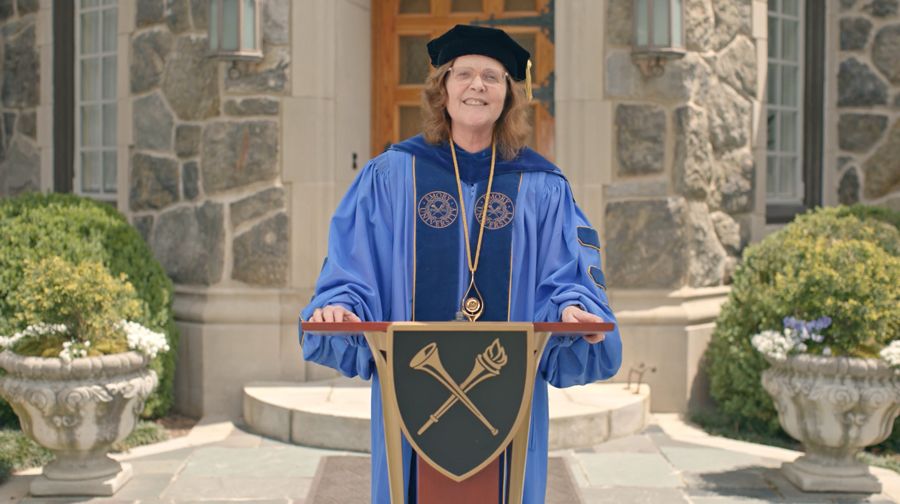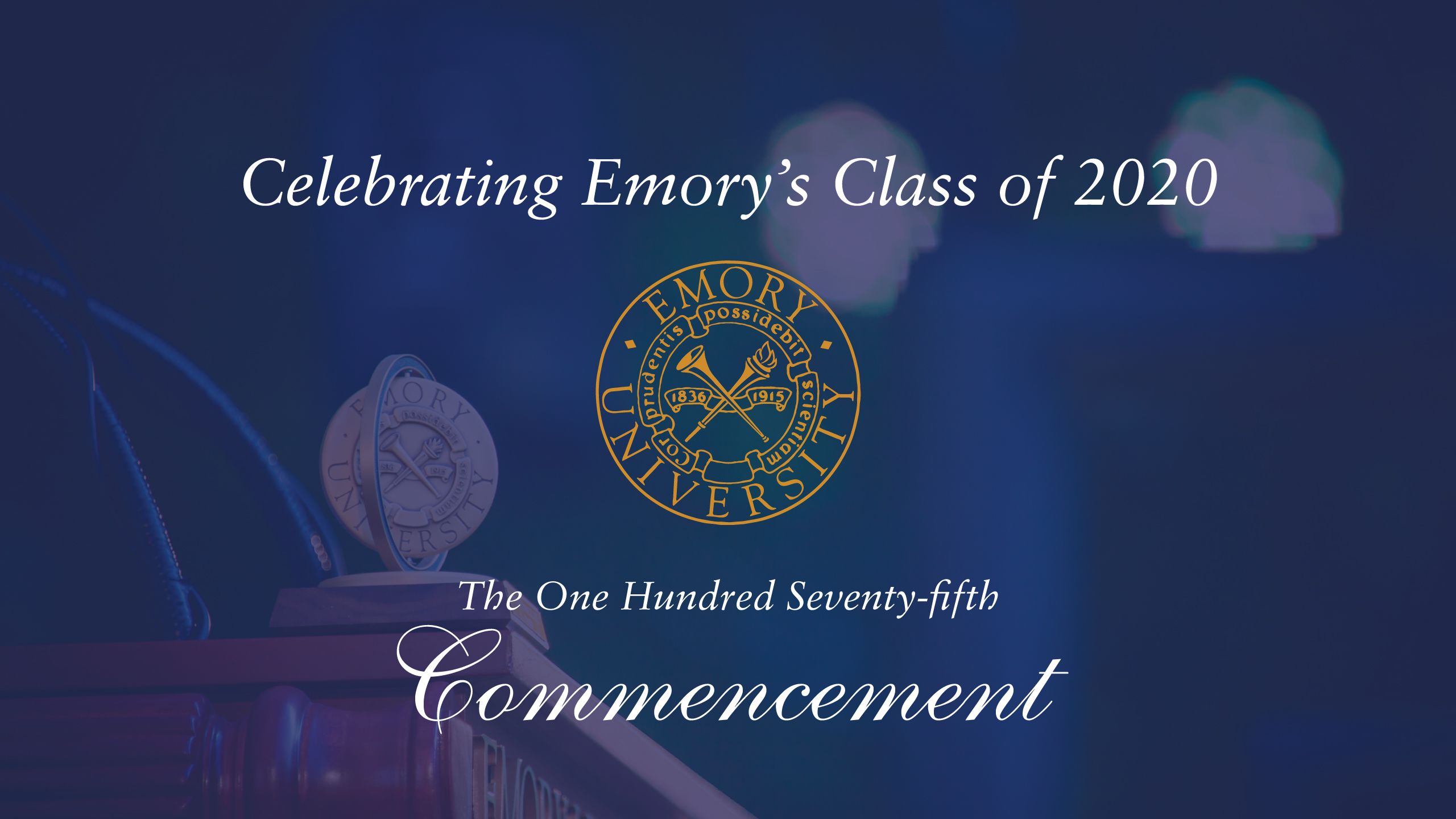
Visit Emory’s interactive Commencement website to view all videos of the university’s 175th Commencement ceremony, Class Day, Baccalaureate services and events from each of the university’s nine schools.
You can also view messages and memories and find your name on the Grad Wall.
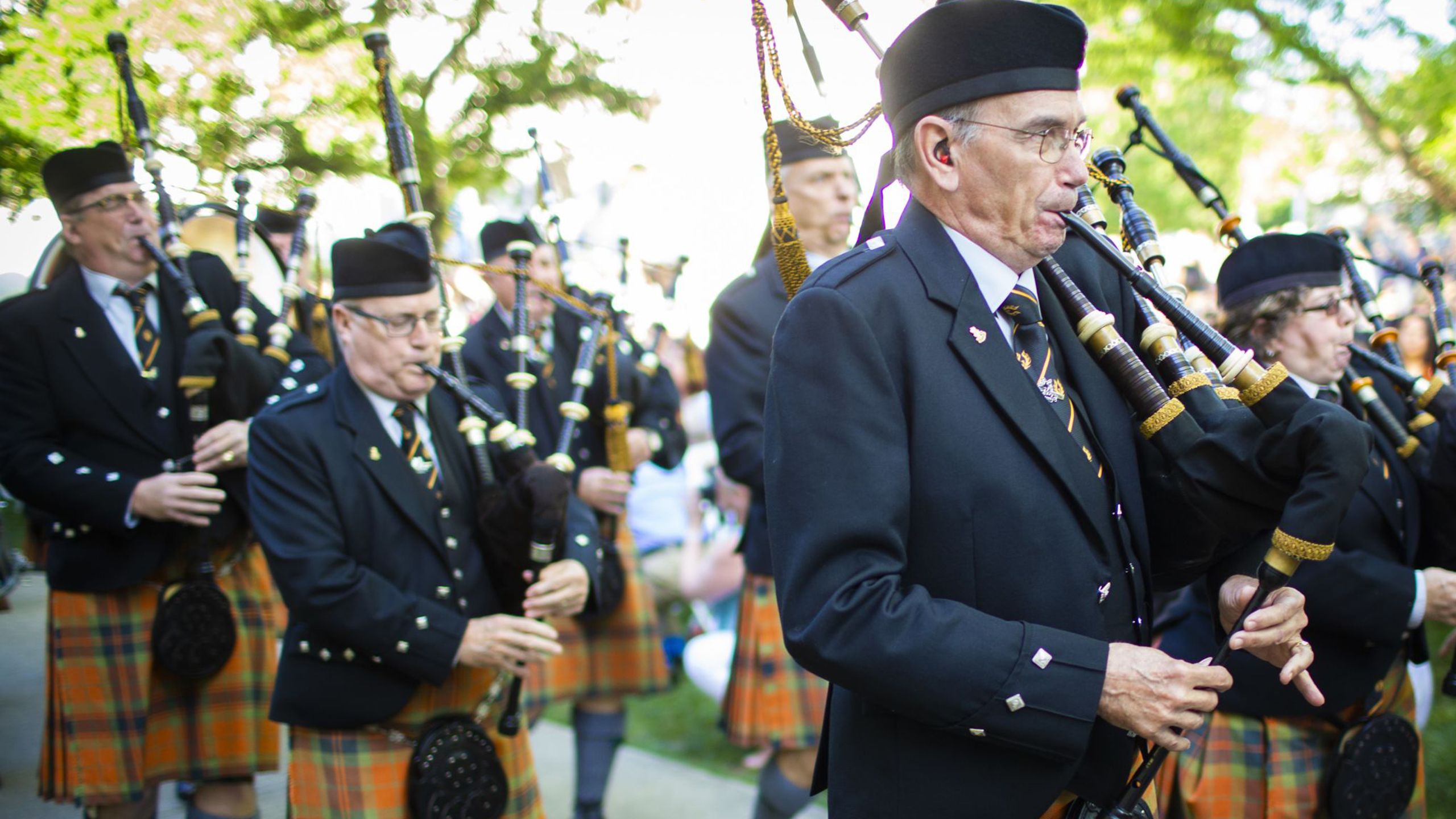
Coming Together for Commencement
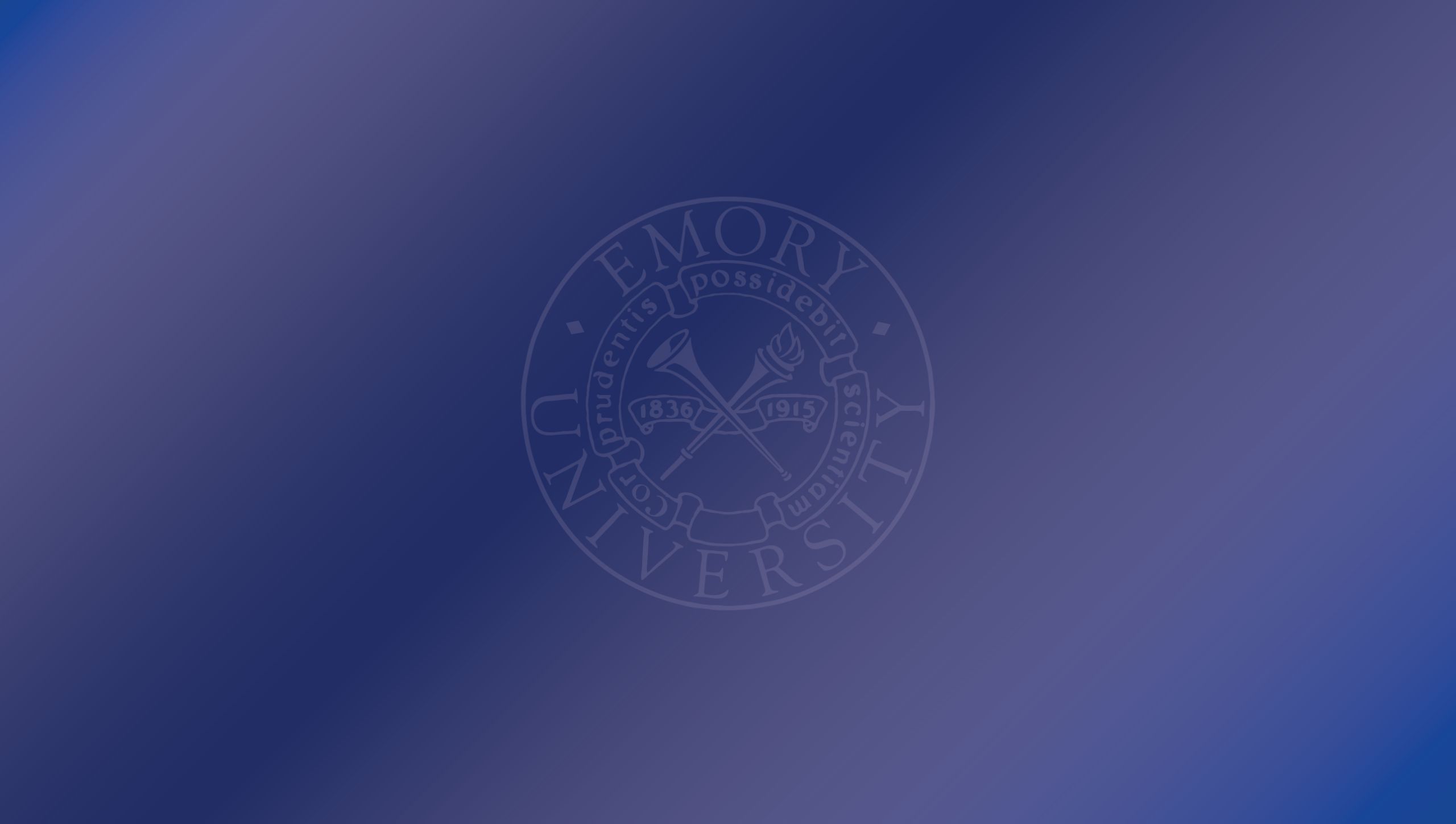
Emory’s 175th Commencement celebrated the extraordinary achievements of the Class of 2020, as this year’s resilient graduates prepare to step forward to meet the needs of a rapidly changing world.
As they begin their own next chapters amid the challenges of the global pandemic, Emory’s newest graduates were urged to meet all that awaits them with hope, creativity and a willingness to shift long-held narratives, setting aside fear and discomfort to confront the inequities that surround us.
“To change the world, we are going to have to do uncomfortable and inconvenient things,” explained social justice advocate and human rights lawyer Bryan Stevenson, who is founder and executive director of the Montgomery, Alabama-based Equal Justice Initiative.
In a keynote address that drew from 35 years spent challenging wrongful prosecutions and overturning death-penalty convictions within the criminal justice system, Stevenson acknowledged that “this is a difficult and challenging time … where unjust inequality has manifested itself in a really tragic way. There are problems that we see that cross barriers and boundaries, but it’s clear that the poor, the disfavored, the marginalized have been particularly impacted by this pandemic.”
To meet the “critical task of overcoming injustice, unfairness and inequality,” Stevenson urged graduates to embrace hope. “Hopelessness is the enemy of justice,” he said. “Hope is a powerful force. It will sometimes make you stand up even when people say sit down. It will make you speak even when people say ‘be quiet.’”
“Hold onto the power of hope,” he said.
This year, Emory’s Commencement and conferral of degrees was presented for the first time on the interactive “Y/our Moment” website — a digital platform that invited the engagement of graduates, their friends and family members, faculty, staff and alumni, and other members of the worldwide Emory community now separated by the COVID-19 pandemic.
The May 11 ceremony featured a good deal of pomp despite the circumstances, upholding cherished Emory traditions, including processional music by members of the Atlanta Pipe and Drum band, a performance of Emory’s alma mater by the student a cappella group No Strings Attached, and welcoming remarks by Emory President Claire E. Sterk, who acknowledged that, like everyone, her wish was that Commencement could have been held on the Emory Quadrangle.
Instead, “we’re spread all over the globe,” Sterk said. “None of us expected that life would be the way it is today, this life-altering experience, where we totally feel the ground shift underneath our feet.”
President Sterk addressed the Class of 2020 via video and officially conferred their degrees. Click the image to watch her full address.
President Sterk addressed the Class of 2020 via video and officially conferred their degrees. Click the image to watch her full address.
Sterk told graduates that she’s “been thinking a lot about what it must be like to have your life changed this much.” And though the ceremony had to be presented on a digital platform, “as a community, the fact that we’re together today — that we’re doing this, that we’re interacting — we’re symbolizing that we care for each other, that we’re there for each other,” she added.
“We need you — we need you for the future, we need you today,” said Sterk, encouraging graduates to retain their confidence and optimism. “We need your courage. Because you are the next generation that’s going to move us forward.”
Praising their accomplishments, resilience and leadership, Sterk conferred degrees upon 4,900 graduates from across the nine schools that comprise Emory University. A total of 4,976 degrees — including 76 joint degrees — were conferred upon students from 52 U.S. states and territories and 94 foreign countries, according to Emory’s Office of the Registrar.
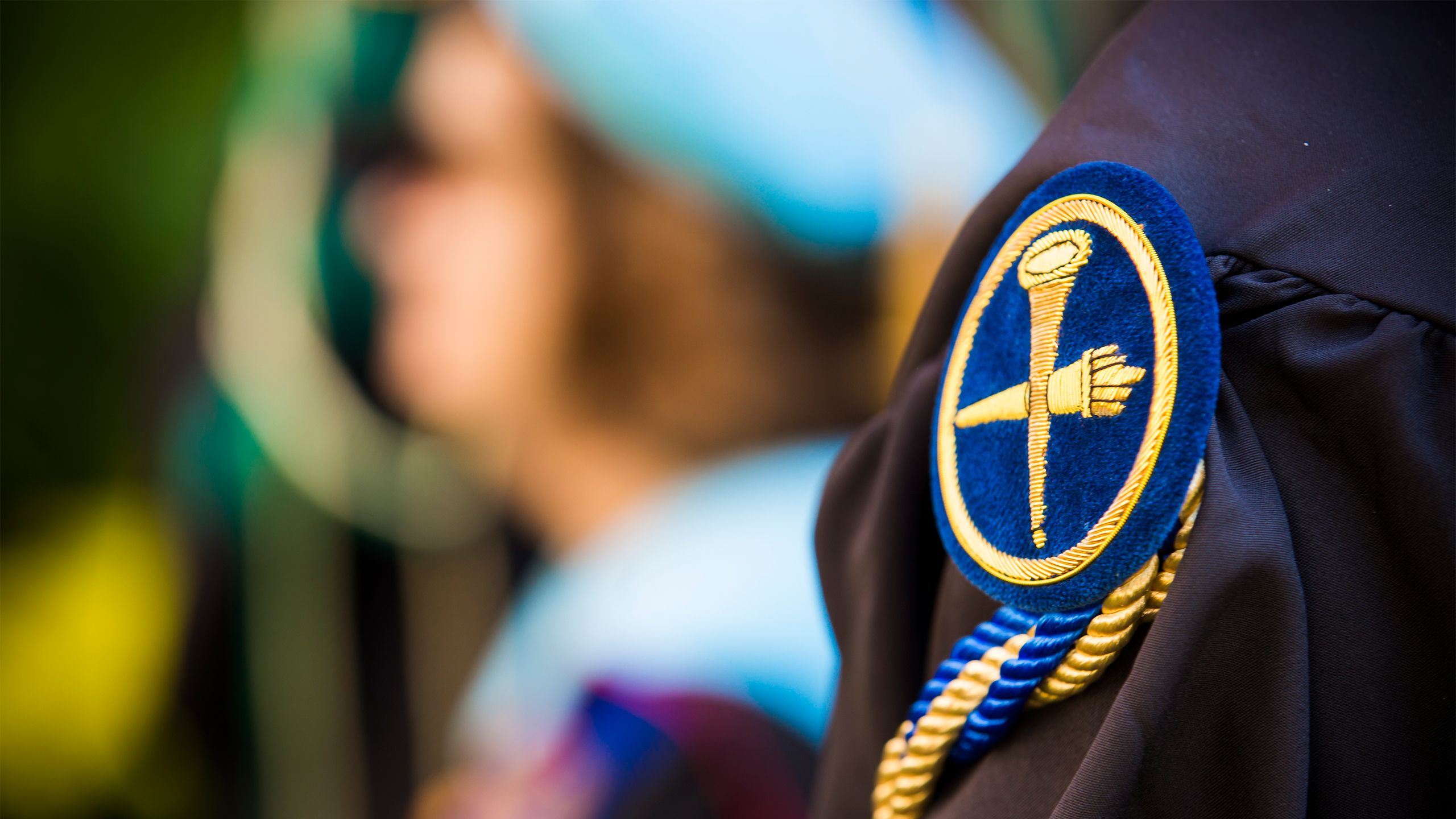
Emory's 175th Commencement took place online, but a handful of graduating students who remain in the Atlanta area found a creative place to watch: the Emory Quad. To maintain social distancing, students gathered with roommates or family with whom they were already sheltering.
Challenging Narratives
Stevenson urges grads to fight to 'improve justice'

Stevenson, who received an honorary Doctor of Laws degree during Monday’s ceremony, led the creation of two nationally acclaimed cultural sites that opened in Montgomery in 2018: The Legacy Museum: From Enslavement to Mass Incarceration and the National Memorial for Peace and Justice. Last year, his 2014 memoir, “Just Mercy,” was made into a major motion picture.
In his address, he outlined critical elements that can help fight injustice. Beyond facing the future with hope, he urged graduates to “get proximate to the poor and marginalized,” finding ways to cross barriers and boundaries to increase understanding.
He also urged America to reject the politics of fear and anger that have shaped our national narrative. “There’s this narrative of racial difference, this myth of racial hierarchy that has shaped our world experience,” he said. “And I think we have to change that narrative, and that means we’re going to have to talk about things we haven’t talked about before.”
“The true evil of American slavery was the myth we created that black people aren’t as good as white people …. and that narrative has continued. I don’t think slavery ended in 1865, I think it just evolved” into a subsequent century of discrimination, terror and race-based lynchings, said Stevenson, whose great-grandfather was a slave in Virginia.
He cited the recent killing of Ahmaud Arbery, which resonated with Emory leaders as a critical reminder of the need to speak out for justice.
“Just a couple of months ago, a young black man was killed in Southeast Georgia running through a neighborhood,” Stevenson said. “He was hunted, and I believe wrongfully killed, because of this narrative that made us believe that we can act in this way. We have got to challenge this narrative.”
Stevenson urged the Class of 2020 to continue this work. “To be an Emory graduate is an extraordinary achievement,” he said. “But I don’t want you to think you’ve done the hardest thing that you have to do. You are going to have to do some uncomfortable things with the degree that you’ve earned if you’re going to improve justice.”
In Montgomery, Alabama, a generation ago, “people were segregated and isolated and excluded and oppressed — and yet they had this belief, and they came together and they fought and they marched and they died and they lifted their voices and whenever they had something in front of them, they would say, ‘We shall overcome…’”
“I am persuaded today that we shall overcome, despite the complexity and challenges of the moment. But it will take a generation like you, graduates like you, who will help us get there.”
Emory also conferred two other honorary degrees at the May 11 ceremony:
- Françoise Barré-Sinoussi is a virologist and a winner of the Nobel Prize for Medicine in 2008 for her contributions to HIV/AIDS research and as a co-discoverer of HIV.
- Alison Singer, mother of a child with autism and legal guardian for her adult brother with autism, is co-founder and president of the Autism Science Foundation.
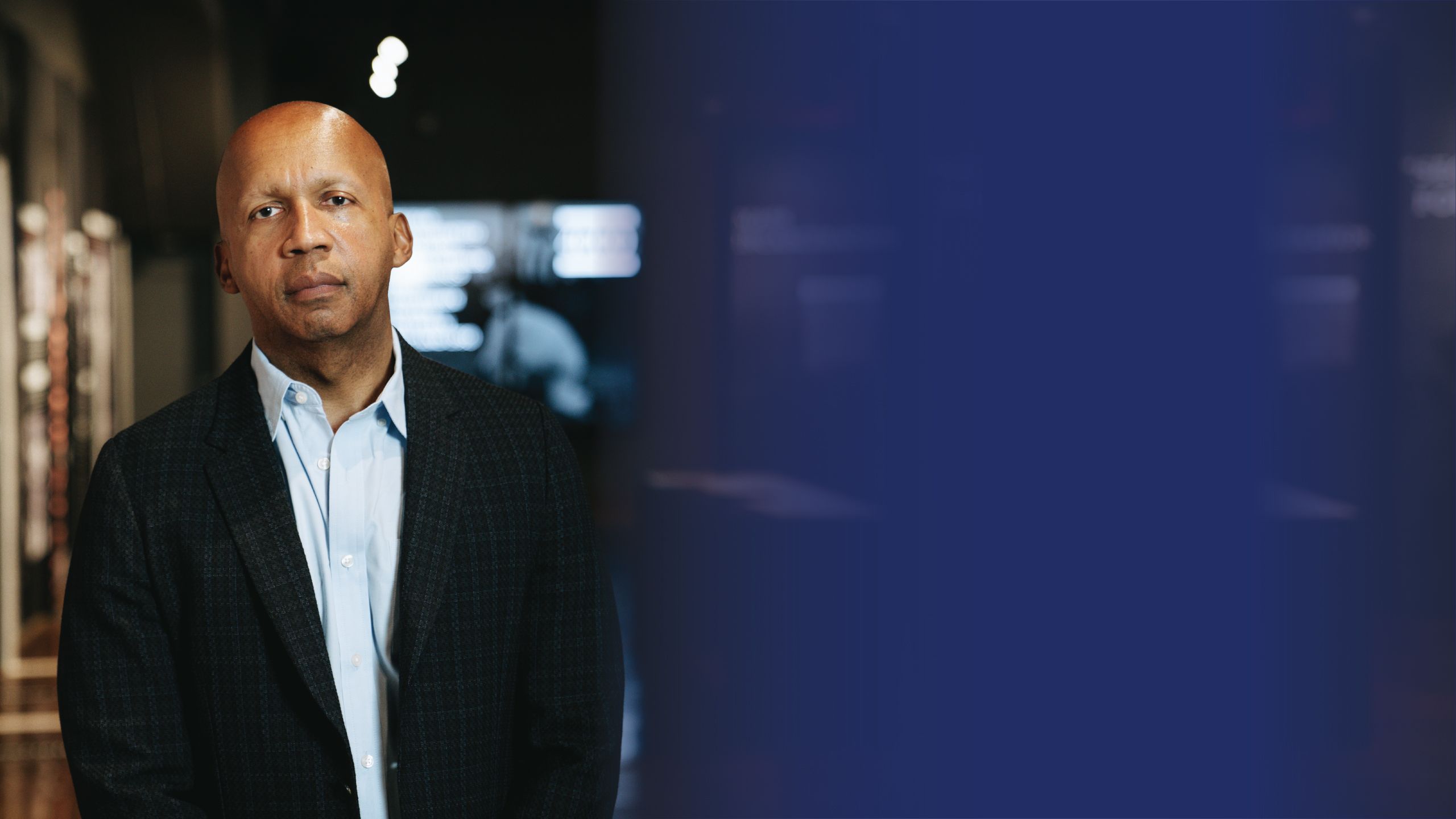
Class of 2020: By the Numbers
Looking forward, looking back

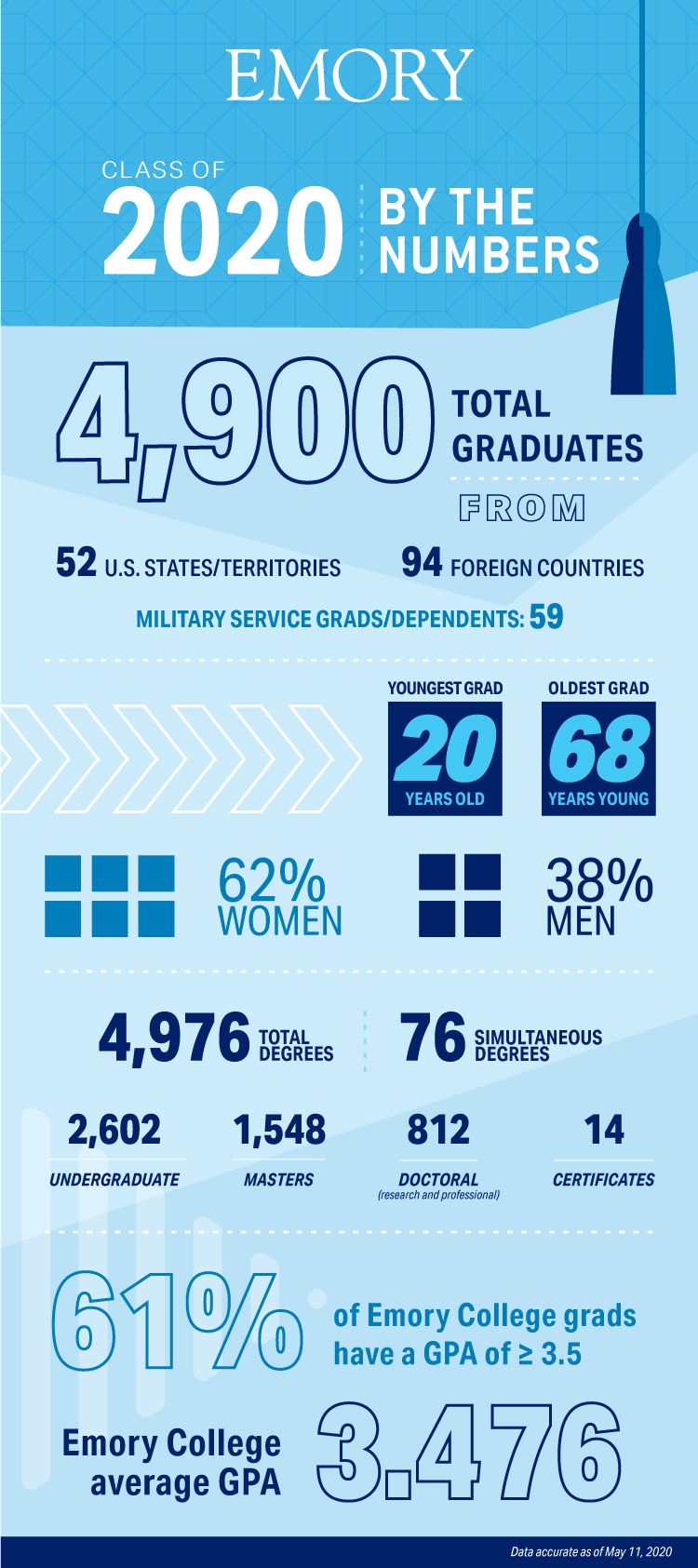
Despite a new platform, Commencement still provided a time of celebration – to look back upon friends and fond memories, and to look ahead at new jobs, internships, the pursuit of advanced degrees and future opportunities.
Through video montages and a running stream of congratulatory social media posts, Emory graduates reflected on what it meant to achieve their academic goals — particularly in the face of a historic pandemic. For some, that meant never again taking anything for granted. For others, the experience brought lessons in compassion, creativity and community building.
- View student reflections from the Class of 2020.
- View faculty messages for the Class of 2020.
- View alumni messages for the Class of 2020.
For Mariam Hassoun, a senior graduating from Emory College of Arts and Sciences with degrees in political science and interdisciplinary studies, attending both Oxford and Emory colleges gave her the space to be herself. “I could be Southern, I could be Muslim, I could be Iraqi and I could be American, because I am all of those things at once, and many more,” said Hassoun, who is preparing to study international and comparative education at Oxford University in England this fall.
For Maria McNiece, who is graduating with a double major in organization and management and dance and movement studies, the road forward leads to New York City, where she will blend the worlds of dance and business as a choreographer and modern dancer.
She arrived at Emory from Gainesville, Florida, “eager to explode my world view,” she recalls. Once here, she found a wellspring of creativity and the chance to perform at Emory as well as with other Atlanta dance companies. “I started dancing in high school, which is late, and I was met with a lot of discouragement,” McNiece recalled. “I’m also queer, and that wasn’t encouraged. In Atlanta, I found acceptance, and that’s been a game-changer for me.”
Within the classroom, she also discovered how to market herself as an artist. “In that way, Emory exceeded my expectations, facilitating everything I wanted for a happy, successful life and propelling me into the adult world with values I stand by and an approach to my career I’m really proud of.”
Suman Atluri said he leaves Emory “confident that I’m more ready to take on challenges and make an impact in the real world because of the people I’ve met here and the lessons I’ve learned both inside and outside of the classrooms.”
“I’ve always said that the people at Emory are the reason our community is amazing and the community is what makes the university so special and unique,” said Atluri, who is graduating with a bachelor’s degree in psychology to work in tech consulting in Chicago, specifically focusing on software implementations for universities and academic medical centers.
Looking back, Atluri knows the Emory community will always hold a special place in his heart. “And while senior year didn’t pan out like I, or really anyone of us, expected it to, today is not a goodbye — it’s an opportunity to look back and appreciate all of the experiences I’ve had in the place I’m honored to call my second home.”
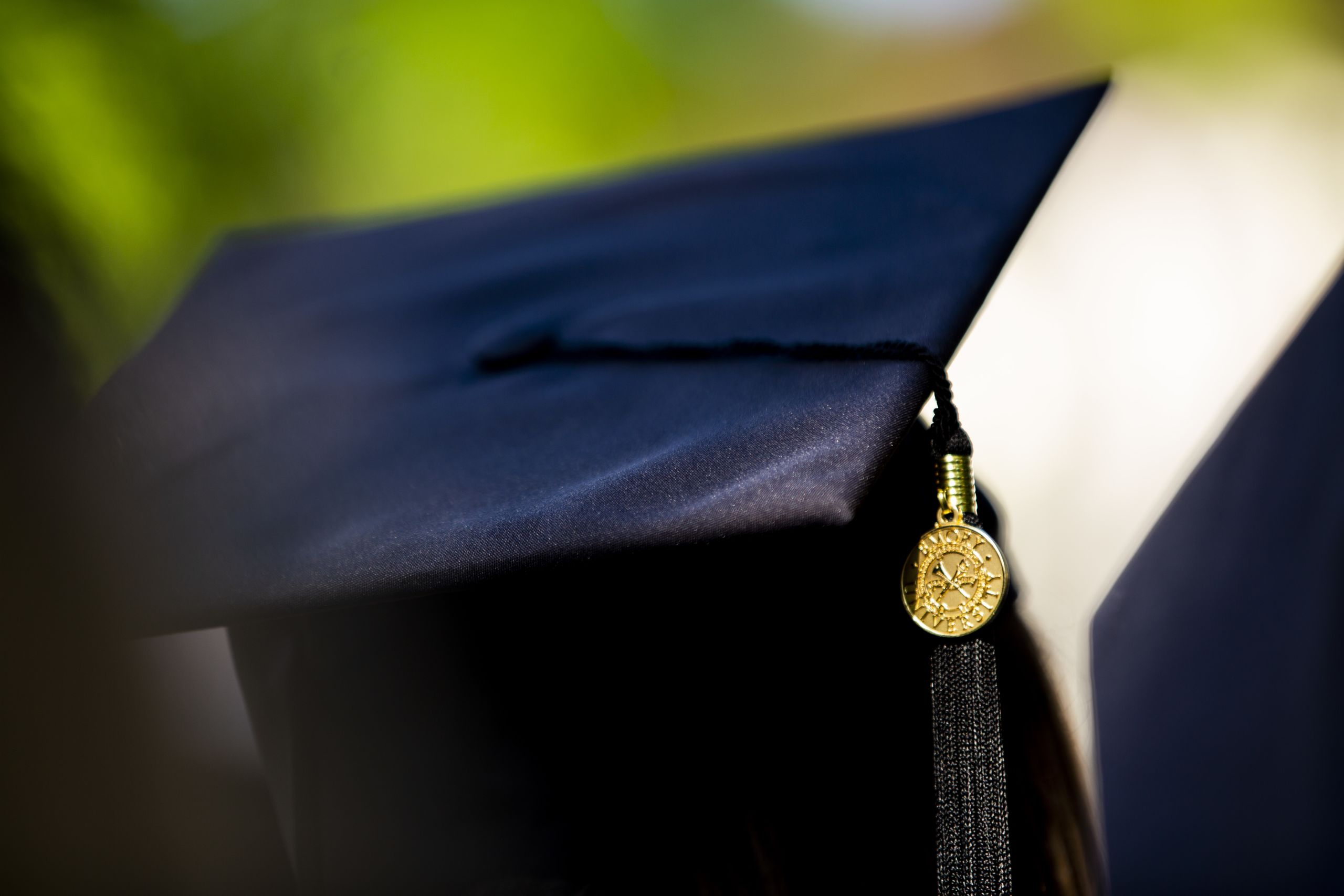
Watching Emory's 175th Commencement online, a member of the Class of 2020 moves the tassel on his graduation cap from right to left to mark the official conferral of degrees and his transition from student to alumnus.
Commencement Stories
Video conversations with students and those who have supported them

Carmen Reid 20M and Dr. Don Batisky, professor of pediatrics at the Emory School of Medicine and executive director of pre-health mentoring for Emory’s College of Arts and Sciences
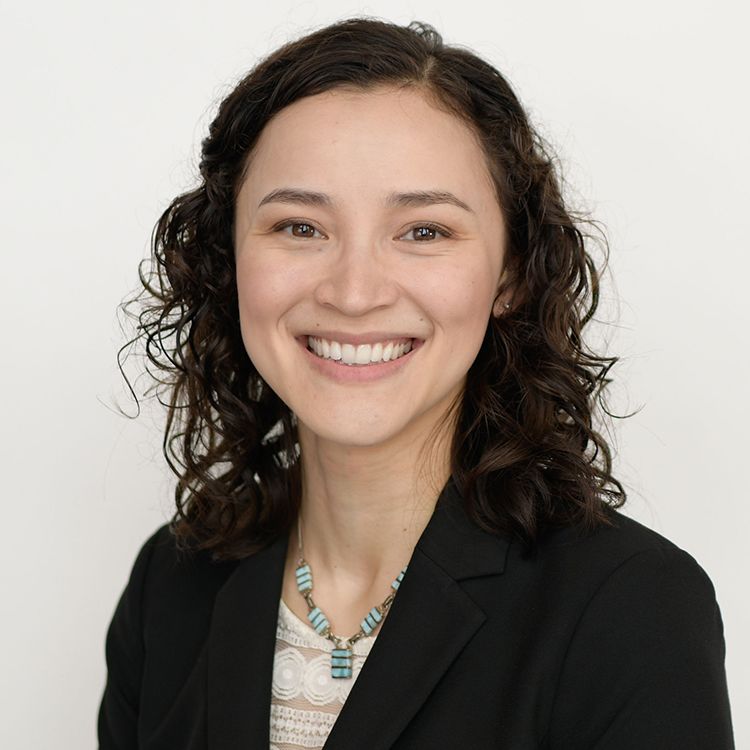
Carmen Reid 20M
On her first day of orientation at the Emory School of Medicine, Carmen Reid was assigned to a “small group” led by Dr. Don Batisky, who would mentor the student cohort throughout all four years of their medical studies.
In Batisky, Reid found a supportive, optimistic guide who radiated the great joy he found in pediatric medicine, a specialty she would come to embrace as her own. In Reid, Batisky saw all the makings of a bright, capable, compassionate healer.
As Reid prepares to begin a pediatric residency at Rush University Medical Center in Chicago, the pair reflect upon her journey and what it’s like to send off medical students to begin their careers in the midst of a global pandemic.

Carmen Reid 20M
Carmen Reid 20M
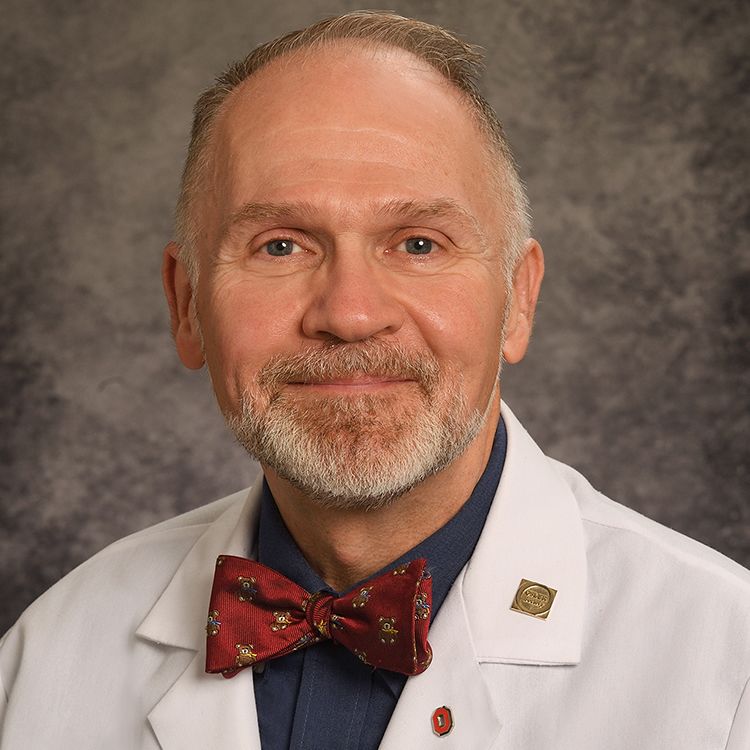
Don Batisky, Carmen Reid's mentor
Don Batisky, Carmen Reid's mentor
Keresa Richards 20BBA and Faith Richards, her grandmother
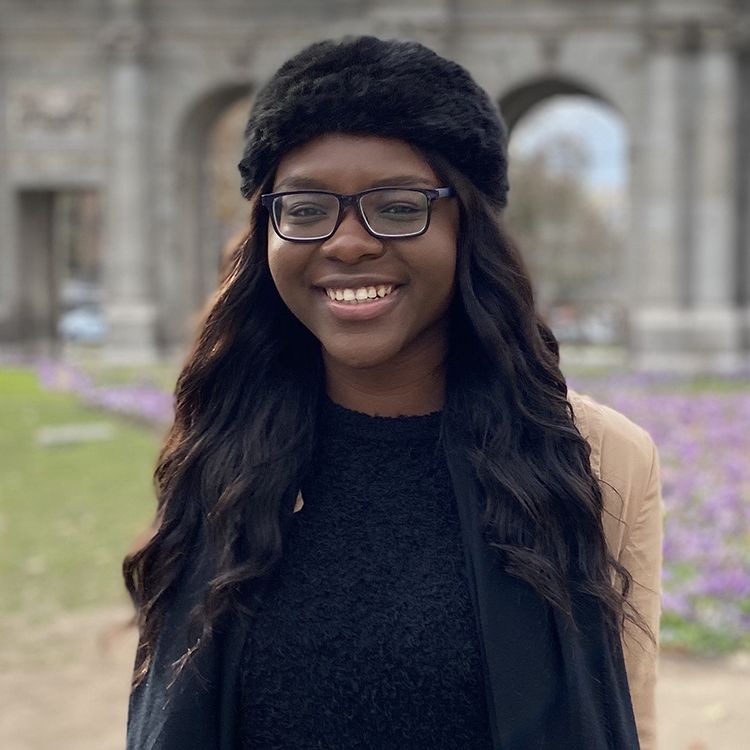
Keresa Richards 20BBA
Keresa Richards was five years old when her grandparents brought her from tiny Crofts Hill, Jamaica, to live with them in Smyrna, Georgia. Her grandmother, Faith Richards, has always been impressed by Keresa’s eagerness to try new things — along with a stubborn streak of perfectionism.
“Some parents have to tell their children to read a book. I had to tell you to put them down. We would go to the grocery store and you would be walking down the aisles, reading,” she laughs.
This month, Keresa becomes the first in her family to earn a college degree — a bachelor’s of business administration from Goizueta Business School, with concentrations in marketing and strategy and management consulting — as she prepares to begin her career in Atlanta with Ernst & Young.
And her grandmother could not be prouder.

Keresa Richards 20BBA
Keresa Richards 20BBA
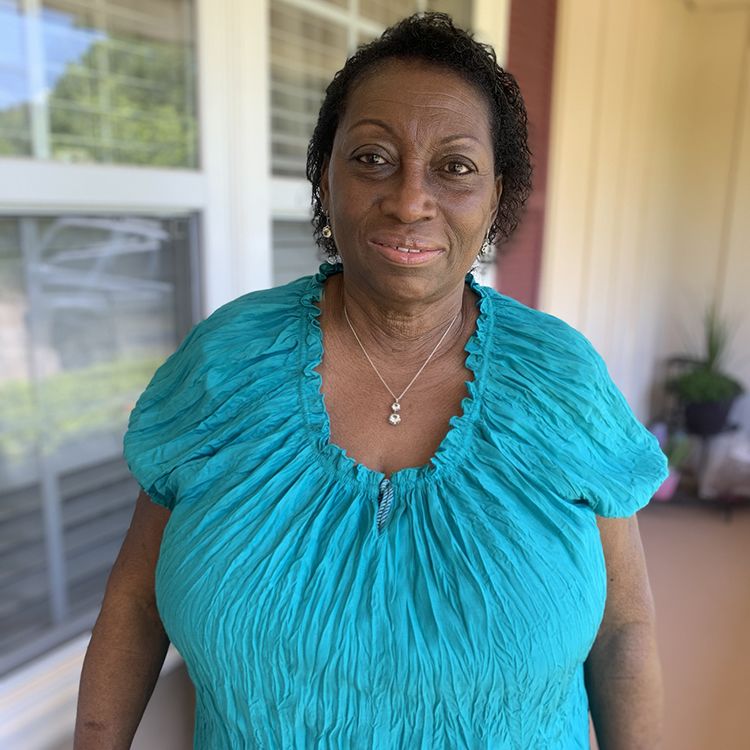
Faith Richards, Keresa Richards' grandmother
Faith Richards, Keresa Richards' grandmother
Joseph Lee 20C and his roommate, Jeremy Medina 21N
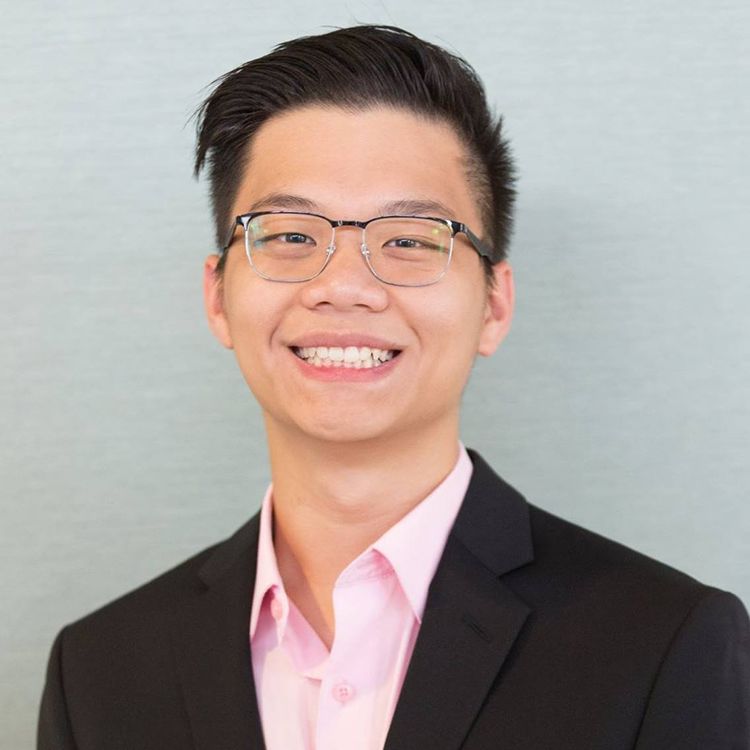
Joseph Lee 20C
Being the first in your family to attend college “is like going into a dark tunnel without a flashlight — no one has been in this cave before, and every single thing you do is a first,” says Joseph Lee, who graduates from Emory College of Arts and Sciences with a double-major in biology and chemistry.
But for Lee, who dreamed of attending Emory since he was in the fourth grade, the academic journey was made easier by the friendship and support of Jeremy Medina, who has been his roommate for the past four years.
Though they attended different area high schools, the pair met as “Community Action for Teen” volunteers and discovered they had much in common — both grew up in multicultural, diverse communities near Buford Highway and value the region’s rich diversity. After rooming together for four years, they are now both pursuing careers in nursing.
Facing all the challenges of college life — moments both grand and goofy — Lee says there may be no one who knows him better than Medina, his “brother from another mother.” As Lee now prepares to begin a master’s degree in nursing, he talks with Medina about his Emory experience.
ABOUT THIS STORY: Writing by Kimber Williams. Highlight, Commencement Stories and slideshow videos by Stephen Nowland and Corey Broman-Fulks. Campus photos by Kay Hinton. Stevenson photo by Rog and Bee Walker. Design by Laura Dengler. Published May 11, 2020.

Joseph Lee 20C
Joseph Lee 20C
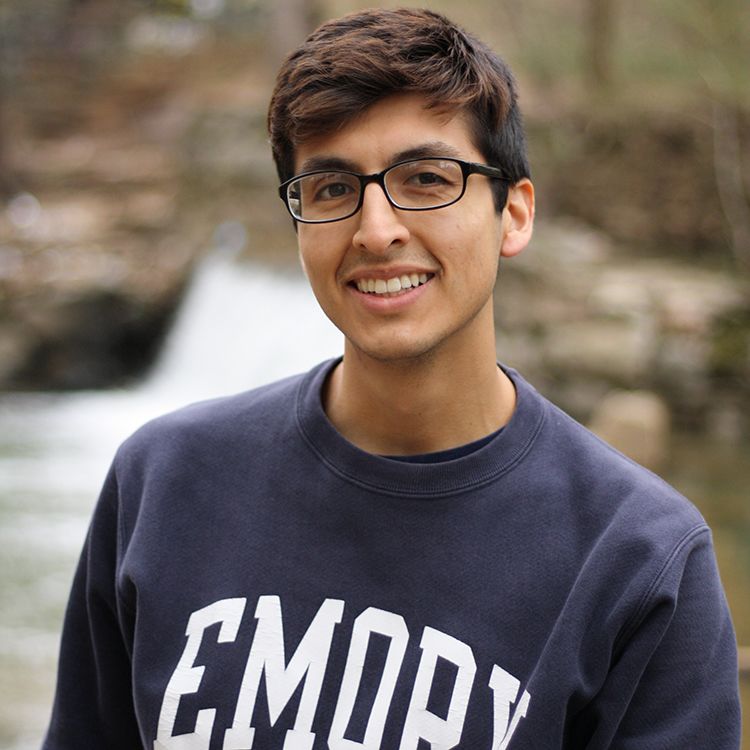
Jeremy Medina 21N, Joseph Lee's friend and roommate
Jeremy Medina 21N, Joseph Lee's friend and roommate
Awards & Honorary Degrees
Students, faculty and community members receiving Emory's top honors at Commencement

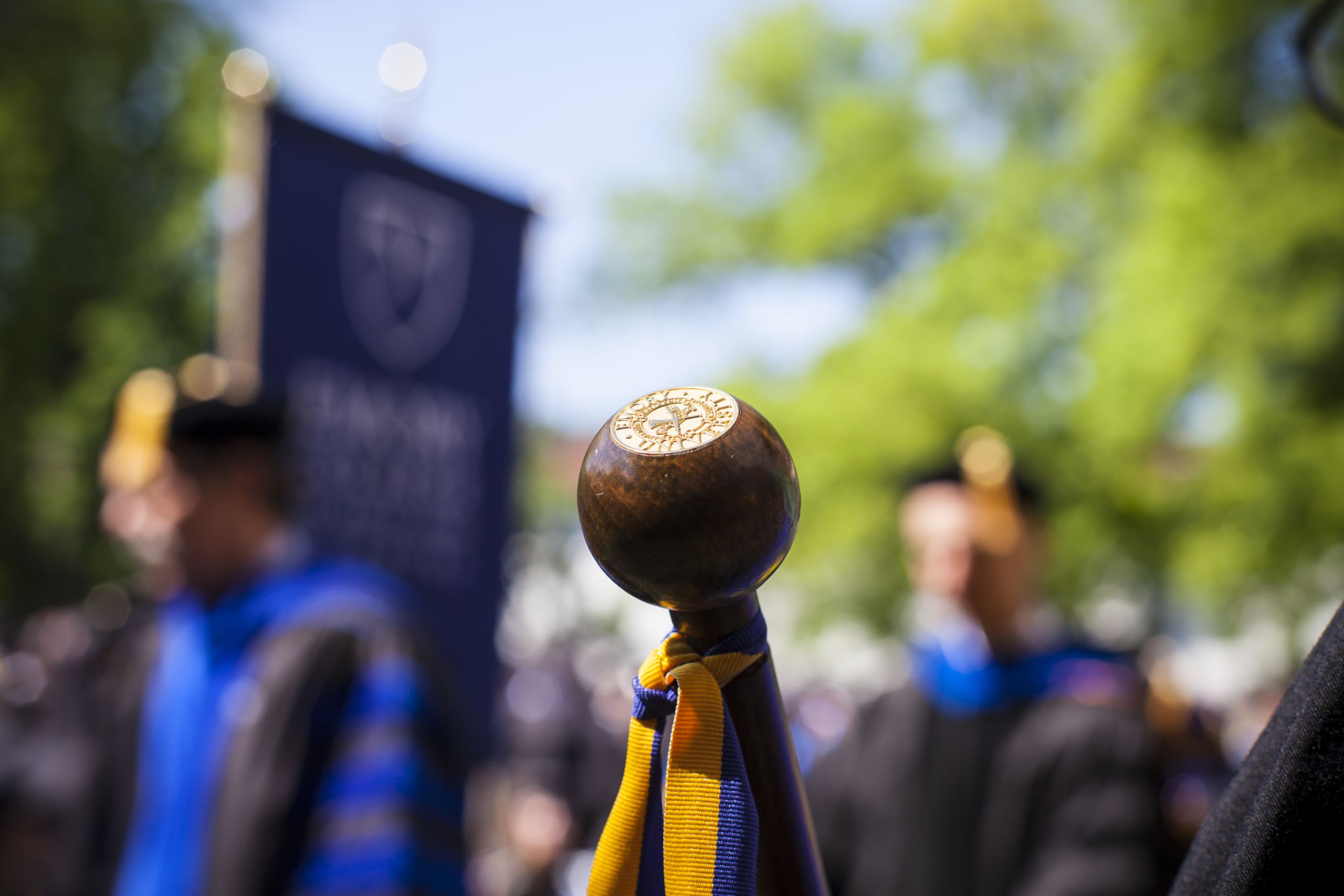
Outstanding Graduates
Exemplary students from each of the nine schools that make up Emory University


To learn more about Emory:
Please visit Emory University and the Emory News Center



